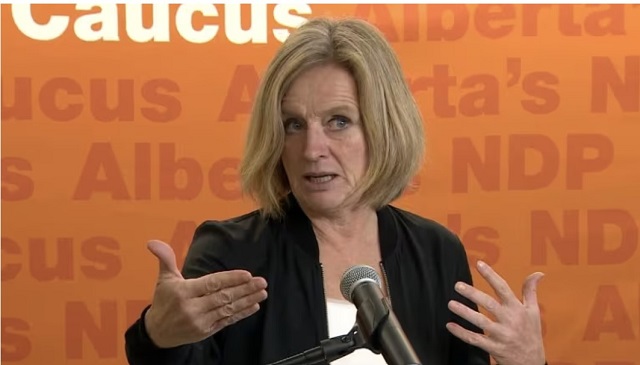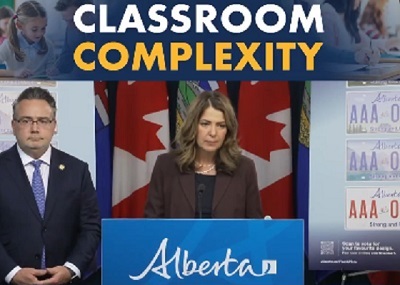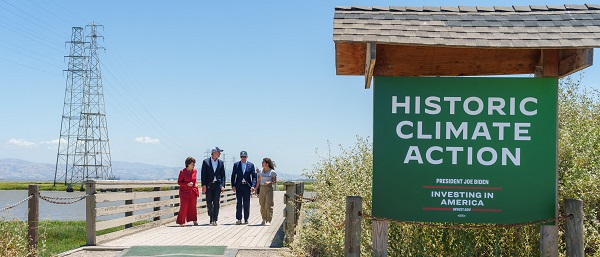Alberta
Former Premier Rachel Notley steps down as leader of the Alberta NDP

News release from the Alberta NDP
Good morning everyone.
We’re gathered on the traditional territory of Treaty 6 and I also want to acknowledge the Metis people who share a deep connection to this land.
There’s been a great deal of speculation since the election as to my future. While politics to the south of us would suggest I have at least 20 years left in my political career, I think the advisability of that is debatable.
More to the point, having considered what I believe to be the best interests of our party, our caucus, as well as my own preferences, I am here today to announce that I will not be leading Alberta’s NDP into the next election.
I have informed both the senior officers of Alberta’s NDP as well as my caucus and staff that upon the selection of a new leader, I will be stepping down from that role.
This October will be 10 years since I was first given the honour of leading our party.
At the time we were the fourth party in the legislature with a massive caucus consisting of four MLAs. Less than seven months later we had a caucus of 54 MLAs, and Alberta’s first NDP government.
While many of those folks never expected to be elected…
…let alone find themselves in a government cabinet, we scrambled, quickly, to live up to the immense privilege the people of Alberta bestowed upon us.
We didn’t get everything right. But we governed with integrity, an ambitious agenda and an earnest desire to make life better for Albertans.
While this is not the place to go down into a policy rabbit hole, I will highlight just a few of the things that make me proud.
We approved and built the Calgary Cancer Centre – a decision that was at least a decade overdue.
We stood up for the rights of working people – improving their access to unions, increasing their holidays, protecting their safety in the workplace …
…And we were the first jurisdiction in North America to raise the minimum wage to $15 per hour, making a real difference in the life of Alberta’s working poor and tens of thousands of young people and their families.
We secured Alberta’s first pipeline to tidewater in over 50 years, ensuring that the return to Albertans for the sale of resources we all own is permanently increased.
We eliminated coal-fired electricity in Alberta, thereby increasing the health of countless citizens, and at the same time kickstarting our renewable energy industry to be the fastest growing on the continent…
…all while significantly reducing our emissions in one fell swoop.
And, finally, in the midst of a recession caused by the international collapse in the price of oil (seriously folks, I did not cause that), we cut child poverty in half.
But, as I said, we didn’t get it all right. And Albertans told us so in April of 2019.
Now I thought about leaving then. And there are many reasons I did not. But the biggest is probably this: too many people were declaring that the Alberta NDP was done, and, more importantly, that Alberta was destined to revert back to being a one party conservative state.
And I knew that wasn’t true. And I also knew that it would be awful for Albertans if they came to believe that it was.
So four years later, last spring, we came so close to earning the right to lead Alberta again.
We received the highest percentage of the vote that the Alberta NDP ever has.
We won Edmonton,
We won the majority of seats in Calgary,
We increased our vote throughout the province and we elected the largest Official Opposition in the history of this province.
An opposition that is very very ready to take over the reins of government.
But it wasn’t enough. And that’s why it’s now time for me to leave.
But if there is any ONE accomplishment that I can leave behind me… it’s that we are NOT a one party province where Albertans have no real choice about how their province is run.
Albertans do not ever have to feel that elections and their opinions don’t matter.
It was that way when I started. It’s not that way anymore.
Not only do I leave Albertans with that electoral choice, I leave them with a caucus that is filled with expert, dedicated, diverse people, supported by the hardest working and most skilled political staff in the country.
Our NDP team will not stop fighting to make life better for all Albertans.
We will fight to protect and improve our healthcare, to stand up for our children’s right to a world-class education, to fix the housing crisis, to keep Albertan’s CPP safe, and to confront the reality of climate change.
Roughly ten years ago today, I talked to my kids about how they’d feel if I decided to run for the leadership of the Alberta NDP.
Roughly 15, 12 and 10 years ago, I listened to my husband tell me he thought I should run for the leadership of the Alberta NDP.
In all cases, my family got a bit more than they’d bargained for. It’s been a crazy ride, but I could not have done it without them.
I was raised by both my father and my mother to believe that public service is something one should strive for throughout your life.
I wish they could have been here to see some of what we’ve accomplished.
Either way it would not have happened without the examples they both set – demonstrating daily the value of hard work, compassion for our neighbours and the importance of their social democratic convictions.
To all the volunteers, activists, donors, canvassers, past current and future in Alberta’s NDP — Thank you.
There would be no success without you. You are the strength and the foundation of our movement and I will be forever humbled by your selfless dedication to our province.
Short of having, raising, and debating with my family, the opportunity to serve this party and this province has been the honour of my life.
Over the last decade, Albertans have given me a tremendous opportunity to serve in this role and I am so grateful.
The people of our province are bold, friendly, open, caring and adventurous. I’ve learned so much from them. And the land we share is the most beautiful — and sometimes the coldest — place on earth.
I also want to thank the people of Edmonton Strathcona who have supported me since 2008. We live in and are part of a fabulous community that I am so proud to call home.
Thank you to all the Albertans I’ve met along the way – those who advised me, supported me, disagreed with me, and, yes, even campaigned against me.
We all love this province.
I love this province and I know that our best days are still ahead.
Thank you.
Alberta
Diploma Exams Affected: No school Monday as ATA rejects offer of enhanced mediation

Premier Danielle Smith, Minister of Finance Nate Horner, and Minister of Education Demetrios Nicolaides issued the following statement.
“Yesterday, the Provincial Bargaining and Compensation Office wrote to the Alberta Teachers’ Association (ATA) and formally requested an agreement to enter an enhanced mediation process.
“This process would have ensured that students returned to the classrooms on Monday, and that teachers returned to work.
“Negotiating would have continued with the ATA, Teachers’ Employer Bargaining Association (TEBA) and a third-party mediator to propose a recommended agreement.
“We are very disappointed that the Alberta Teachers’ Association refused this offer. Teachers and students should also be disappointed.
“PBCO made this offer to the ATA because the union has not made a reasonable offer and this strike is impacting students. Alberta’s government is trying to put kids first and bring an end to this strike.
“The offer of enhanced mediation provided a clear path to ending it.
“We want the same things as the ATA: More teachers. More pay for teachers. More educational assistants. And more classrooms.
“This strike has gone on too long and we are extremely concerned about the impact it is having on students.
“We are willing to consider further options to ensure that our next generation gets the world-class education they deserve. After about three weeks, a strike of this nature would reach the threshold of causing irreparable harm to our students’ education.
“The ATA needs to do what is right for its members, and for all Alberta students.
“If it refuses to do so, we will consider further options to bring this strike to an end.”
Diploma exam update
November diploma exams will be optional for students.
With instructional time in schools disrupted due to the teacher strike, the November 2025 diploma exams will now be optional for students. Students who wish to write a diploma exam may request to do so, and their school boards will accommodate the request.
The optional diploma exams apply to all schools provincewide. These exams will still take place on the currently scheduled dates.
Students who choose not to write the November diploma exams can still complete their courses and graduate on time. Their final grade will be based entirely on the school-awarded mark provided by their teacher.
Choosing not to write the November diploma exams will not affect a student’s ability to apply to, be accepted by, or attend post-secondary institutions after graduation.
No changes have been made to the January and June diplomas and provincial achievement tests.
Quick facts
- Students are automatically exempted from writing the November diploma exams but can request to write them.
- School boards must allow the student to write the diploma exam if requested.
Alberta
Alberta taxpayers should know how much their municipal governments spend

From the Fraser Institute
By Tegan Hill and Austin Thompson
Next week, voters across Alberta will go to the polls to elect their local governments. Of course, while the issues vary depending on the city, town or district, all municipal governments spend taxpayer money.
And according to a recent study, Grande Prairie County and Red Deer County were among Alberta’s highest-spending municipalities (on a per-person basis) in 2023 (the latest year of comparable data). Kara Westerlund, president of the Rural Municipalities of Alberta, said that’s no surprise—arguing that it’s expensive to serve a small number of residents spread over large areas.
That challenge is real. In rural areas, fewer people share the cost of roads, parks and emergency services. But high spending isn’t inevitable. Some rural municipalities managed to spend far less, demonstrating that local choices about what services to provide, and how to deliver them, matter.
Consider the contrast in spending levels among rural counties. In 2023, Grande Prairie County and Red Deer County spent $5,413 and $4,619 per person, respectively. Foothills County, by comparison, spent just $2,570 per person. All three counties have relatively low population densities (fewer than seven residents per square kilometre) yet their per-person spending varies widely. (In case you’re wondering, Calgary spent $3,144 and Edmonton spent $3,241.)
Some of that variation reflects differences in the cost of similar services. For example, all three counties provide fire protection but in 2023 this service cost $56.95 per person in Grande Prairie County, $38.51 in Red Deer County and $10.32 in Foothills County. Other spending differences reflect not just how much is spent, but whether a service is offered at all. For instance, in 2023 Grande Prairie County recorded $46,283 in daycare spending, while Red Deer County and Foothills County had none.
Put simply, population density alone simply doesn’t explain why some municipalities spend more than others. Much depends on the choices municipal governments make and how efficiently they deliver services.
Westerlund also dismissed comparisons showing that some counties spend more per person than nearby towns and cities, calling them “apples to oranges.” It’s true that rural municipalities and cities differ—but that doesn’t make comparisons meaningless. After all, whether apples are a good deal depends on the price of other fruit, and a savvy shopper might switch to oranges if they offer better value. In the same way, comparing municipal spending—across all types of communities—helps Albertans judge whether they get good value for their tax dollars.
Every municipality offers a different mix of services and those choices come with different price tags. Consider three nearby municipalities: in 2023, Rockyview County spent $3,419 per person, Calgary spent $3,144 and Airdrie spent $2,187. These differences reflect real trade-offs in the scope, quality and cost of local services. Albertans should decide for themselves which mix of local services best suits their needs—but they can’t do that without clear data on what those services actually cost.
A big municipal tax bill isn’t an inevitable consequence of rural living. How much gets spent in each Alberta municipality depends greatly on the choices made by the mayors, reeves and councillors Albertans will elect next week. And for Albertans to determine whether or not they get good value for their local tax dollars, they must know how much their municipality is spending.
-

 espionage2 days ago
espionage2 days agoBreaking: P.E.I. Urges RCMP Probe of Alleged Foreign Interference, Money Laundering
-

 Business22 hours ago
Business22 hours agoCanada has an energy edge, why won’t Ottawa use it?
-

 Alberta2 days ago
Alberta2 days agoPremier Smith addresses the most important issue facing Alberta teachers: Classroom Complexity
-

 Business22 hours ago
Business22 hours agoFederal Budget 2025: A responsible media would ensure Canadians know about the dismal state of federal finance
-

 Alberta2 days ago
Alberta2 days agoAlberta taxpayers should know how much their municipal governments spend
-

 Business1 day ago
Business1 day agoCutting Red Tape Could Help Solve Canada’s Doctor Crisis
-

 International10 hours ago
International10 hours agoPoland’s president signs new zero income tax law for parents with two children
-

 Daily Caller1 day ago
Daily Caller1 day agoTrump, Putin Agree On High-Stakes Meetings To Negotiate End To Ukraine War





